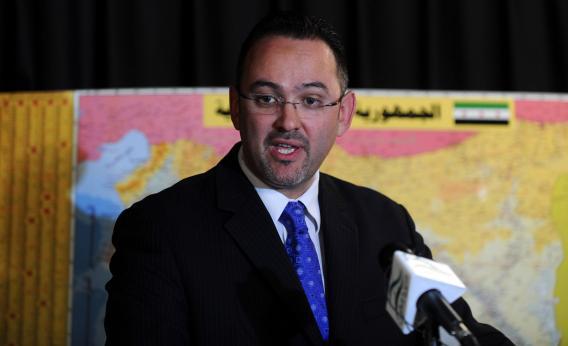I spoke today with Khaled Saleh, spokesman for the National Coalition for Syrian Revolutionary and Opposition Forces—the primary international umbrella group for the Syrian opposition—to get the group’s take on today’s confusing events. On Monday the coalition’s president, Ahmad al-Jarba, co-authored an op-ed in the Washington Post supporting the Obama administration’s push for military action, but that feels like a lifetime ago in this fast-moving debate. Saleh was skeptical about the proposed political solution for Assad’s chemical weapons.
“The proposal is silent on the issue of accountability,” he said. “Everyone now agrees that Assad used chemical weapons and killed 1,466 people. Even if he hands over chemical weapons, he cannot simply walk away from killing that many people. In the bigger picture, he’s also responsible for killing 110,000 people–of those 11,000 children that were killed. The international community shouldn’t be willing to glance over the fact that we have a mass murderer on our hands who’s going to continue killing Syrians.”
Saleh was also skeptical the Assad would comply with any plan for a weapons handover or that Moscow would force him to. “He has not done a single thing in the last 30 months to prove that he will fulfill any promise that he gives,” he said. “His foreign minister goes on TV and says he’s open to a political solution and within an hour he fires Scuds at his own people. We don’t trust the Russians who have been the side of Assad and continue to provide him between two to four shipments of arms per week.”
Saleh said he hoped President Obama would keep the threat of military action on the table and push for authorization from Congress, noting that “The only political movement happened when there was a threat of force. That’s when the Russians and Assad changed their positions.”
As for whether the kind of “unbelievably small” strike being discussed could actually make a difference in the war, Saleh said that the Coalition is hoping they will allow the Free Syrian Army to “at least fortify its positions and gain momentum.”
Asked about suggestions in Congress that a military intervention would aid al-Qaida, he replied that “public opinion is completely skewed” in the United States about the nature of the Syrian resistance. He put the numbers of rebel fighters affiliated with the al-Qaida-linked Jabhat al-Nusra at “at most about 10 percent compared to moderate forces,” though he believes the real number is lower.
Asked about public reluctance to involve the United States in another Middle East conflict, he replied that the Syrian opposition itself opposes the deployment of U.S. ground forces and suggested that “It seems like the discussion is more about Iraq in 2003 than Syria in 2013. This is not about getting the U.S. involved in a new war. This is about ending a war.”
